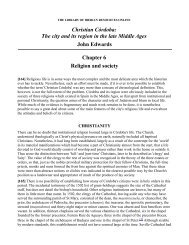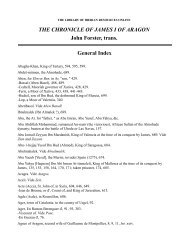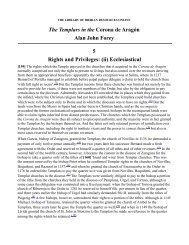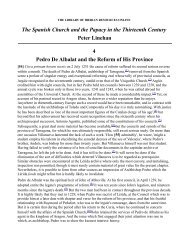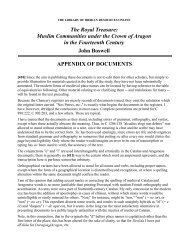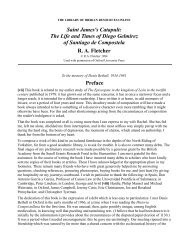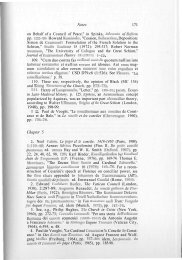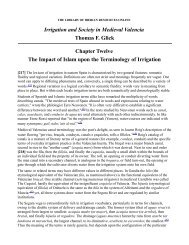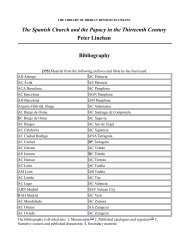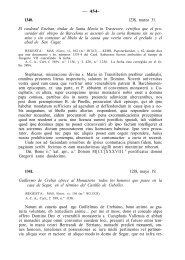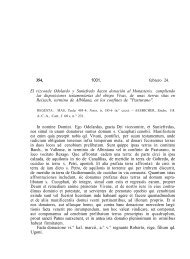PROTESTANTISM - The Library of Iberian Resources Online
PROTESTANTISM - The Library of Iberian Resources Online
PROTESTANTISM - The Library of Iberian Resources Online
Create successful ePaper yourself
Turn your PDF publications into a flip-book with our unique Google optimized e-Paper software.
vigorous orders for their seizure. (81) In January, 1572, it announced to all the tribunals that the Princess<br />
<strong>of</strong> Béarn (Jeanne d'Albret) had recently held an assembly <strong>of</strong> Lutherans, in which it was resolved to<br />
send some <strong>of</strong> their ministers in disguise to Spain as missionaries. <strong>The</strong> utmost vigilance was enjoined to<br />
counteract this effort; all the commissioners were to be warned and prelates be asked to order all priests<br />
and preachers to be on the watch. (82) In June, 1578, it sent letters to a number <strong>of</strong> tribunals, stating that<br />
advices from Valladolid showed that the heretics had printed a New Testament in Spanish, with a<br />
Venetian [451] imprint, and were flooding the land with copies, and also that the heretic ministers had<br />
correspondents in Spain. Great watchfulness was therefore commanded at all sea-ports and frontier<br />
towns, and all persons found in possession <strong>of</strong> the prohibited volume were to be sent to Madrid for trial.<br />
A month later, this scare was renewed on the strength <strong>of</strong> information from Flanders, but the records <strong>of</strong><br />
the Toledo tribunal at this period do not indicate that these efforts were rewarded with any captures. (83)<br />
Whatever proselyting zeal Protestantism may have had passed away with the early years <strong>of</strong> the<br />
seventeenth century. <strong>The</strong> latest work <strong>of</strong> the kind <strong>of</strong> which we hear is that, in 1603, the Prince <strong>of</strong> Anhalt<br />
introduced into Seville a number <strong>of</strong> copies <strong>of</strong> the Bible <strong>of</strong> Cipriano de Valera and, when Catherine,<br />
Duchess <strong>of</strong> Bar, sister <strong>of</strong> Henry IV, heard <strong>of</strong> this, she ordered six hundred copies printed and sent a<br />
Huguenot gentleman, named Hierosme de Taride, to the Duke <strong>of</strong> la Force at Pau, to learn how to<br />
transmit them to Saragossa, when la Force gave him the names <strong>of</strong> parties there who could be trusted to<br />
handle them, but the death <strong>of</strong> the duchess in 1604 put an end to the project. (84) <strong>The</strong> Thirty Years' War<br />
gave the German Protestants ample occupation at home and, after the Peace <strong>of</strong> Westphalia, proselytism<br />
was out <strong>of</strong> fashion.<br />
Yet it was a curious episode <strong>of</strong> the War <strong>of</strong> Succession that when, in 1706, the Archduke Charles and his<br />
English allies seemed for a brief space to be at the point <strong>of</strong> success, when all the kingdoms <strong>of</strong> the<br />
Crown <strong>of</strong> Aragon had acknowledged him and he even for a time occupied Madrid, the opportunity was<br />
seized to circulate a catechism <strong>of</strong> Anglican doctrine in Spanish and other books prejudicial to the faith.<br />
<strong>The</strong> energetic measures adopted by the Inquisition to meet this assault show the strength <strong>of</strong> its<br />
apprehension. It ordered the most careful watch to be kept at all ports and frontier towns. Edicts were to<br />
be published forbidding these and all other works <strong>of</strong> evil doctrine introduced by heretics, and<br />
inquisitors were told to be energetic in punishing the guilty, enforcing their sentences by censures,<br />
interdicts and cessatio a divinis when, if these proved futile they were to abandon, in solemn<br />
procession, the disobedient cities, even at the risk <strong>of</strong> their lives. (85) <strong>The</strong> rising <strong>of</strong> the Spanish people, in<br />
this same year, soon limited the territory occupied by the Allies; we hear nothing more <strong>of</strong> this [452]<br />
attempt at conversion under the shadow <strong>of</strong> the sword and, taken as a whole, the efforts to evangelize<br />
Spain have attracted vastly more attention than their intrinsic importance deserves.<br />
Unsuccessful as were the endeavors to introduce the new doctrines in Spain, there continued to be<br />
occasional cases <strong>of</strong> Spaniards embracing them partially or wholly, <strong>of</strong> which a few examples may be<br />
cited. <strong>The</strong>re was arrested and brought to the Toledo tribunal, December 24, 1562, Hernando Díaz, a<br />
cowherd <strong>of</strong> San Roman, near Talavera. He was a simple-minded creature, who had been at times<br />
melancolico. In the Sierra Morena there had been much talk among the shepherds <strong>of</strong> the Lutheran<br />
doctrines made known in the Seville autos. While working there he had heard <strong>of</strong> them, they fixed<br />
themselves in his wandering mind and, when the fit was on him, he could not help talking <strong>of</strong> his<br />
imaginaciones as he called them, although his wife and daughter and his neighbors, cautioned him<br />
against it. At his first audience he freely admitted having denied the power <strong>of</strong> pope and priest and<br />
asserted that salvation came by faith and love <strong>of</strong> God and charity and love <strong>of</strong> one's neighbor, and not by<br />
the laws <strong>of</strong> the Church or by indulgences and images and pilgrimages. <strong>The</strong> inquisitors treated him



